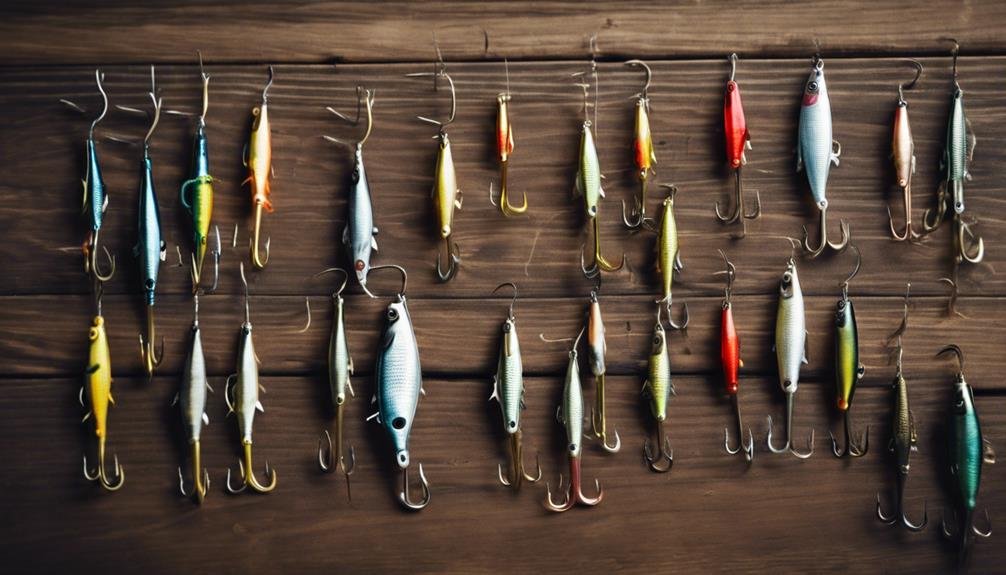When deciding on the right hook size for bass fishing, it’s important to consider the size of the bass you’re after, the type of bait you’re using, and the fishing environment. Different situations call for different hook sizes; understanding these nuances can significantly affect your success rate. For instance, smaller bass might require a different approach than larger ones. But how do you determine the best hook for each scenario? Let’s explore the factors that play into making the best choice for your next bass fishing trip.
Key Takeaways
- For small bass, use light wire hooks around size 2/0.
- Medium bass are best caught with hook sizes from 2/0 to 4/0.
- Large bass requires hook sizes ranging from 1/0 to 5/0.
- Offset worm hooks are versatile and effective for bass fishing.
- Match hook size to the size and type of soft plastic lure used.
Understanding Hook Sizes
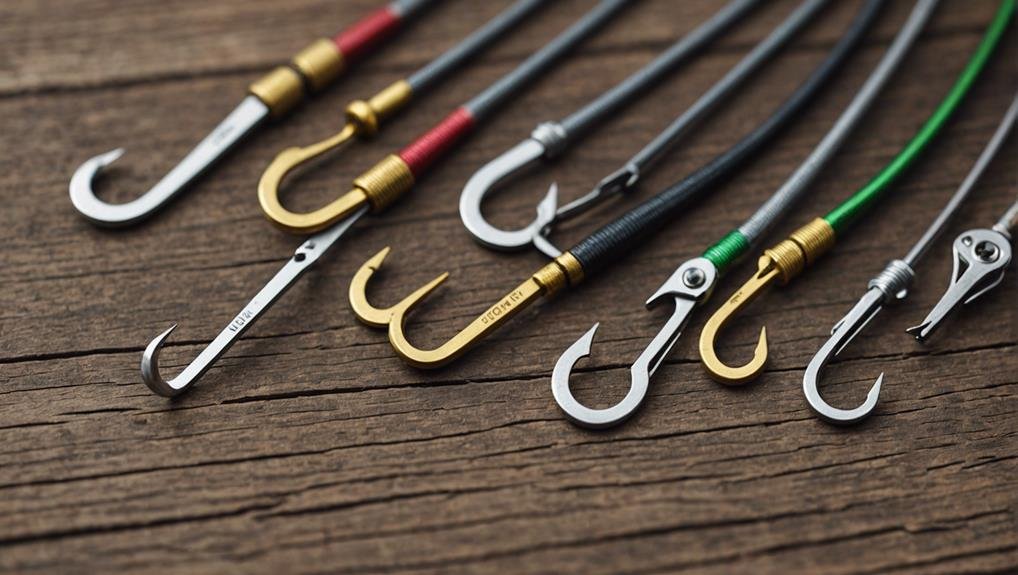
Understanding hook sizes is essential for any angler aiming to catch bass effectively. When choosing the right size hook, it’s important to know that fishing hooks range from size 32, the smallest, to 19/0 aughts, the largest. The larger the number, the bigger the hook gap and the distance between the hook’s point and shank. This gap is vital in bass fishing since it helps secure the lure and improves your chances of a successful catch.
Selecting the right size isn’t just about the numbers, though. It’s also about the specific style of hooks designed for different fishing techniques. For bass fishing, you generally want a hook that balances strength and finesse. A hook that’s too small mightn’t hold the bass securely, while one that’s too large could be too visible and scare the fish away.
Matching your hook size to your target fish species and the type of lure you’re using is key. An ideal hook size for bass often falls between 2 and 5, but this can vary based on the environment and your fishing style. Knowing the correct hook sizes ensures you’re well-prepared for a successful bass fishing experience.
Factors to Consider
When selecting the right hook size for bass fishing, consider the specific type of fishing you’ll do, such as surface or deep water. The type of environment influences your choice; for example, surface fishing might necessitate smaller hooks than deep-water fishing.
Matching the hook size to the soft plastics you’re using is important. If your lure is too big for the hook, it won’t perform effectively, and your chances of catching bass decrease.
The types of hooks you choose also matter. An offset worm hook is popular for bass fishing due to its versatility with various soft plastics. Ensure the hook size aligns with the lure to optimize your fishing efforts. You don’t want a hook that’s too big or too small, as this can impact both the action of the lure and your ability to set the hook successfully.
Lastly, consider the behavior and size of the bass in your fishing area. This information helps you select the right hook size, ensuring you’re prepared for the specific conditions. Properly securing the lure on the hook is essential for effectively catching bass, so don’t overlook this step in your preparation.
Hook Size for Small Bass
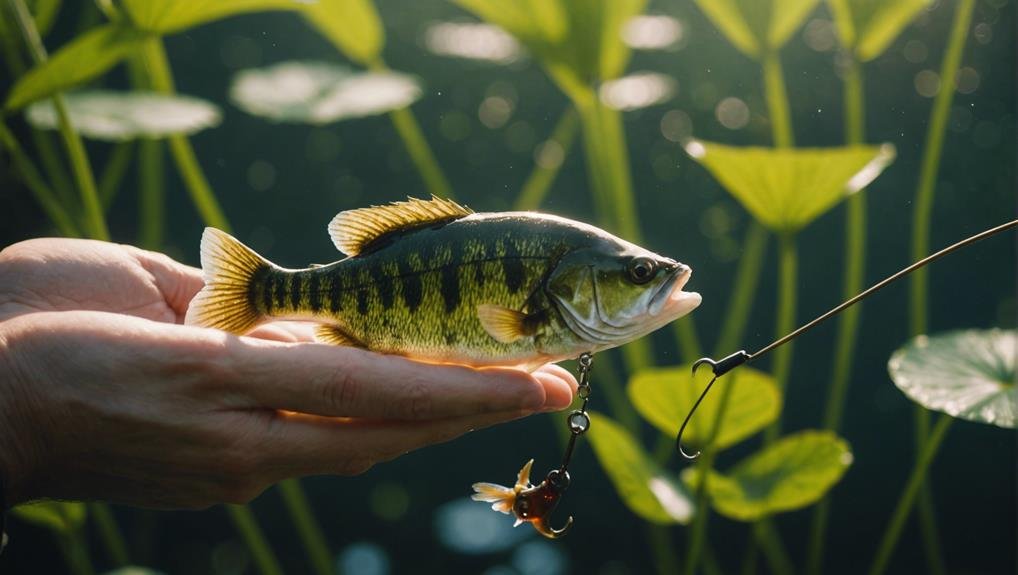
To catch small bass effectively, you should use hook sizes like 2/0, 3/0, or 4/0 that match the fish’s mouth size. These hooks are perfect because they balance large enough to secure the fish and small enough to guarantee easy penetration. Light wire hooks, particularly around the 2/0 size, are beneficial for small bass. These hooks allow a gentle but firm grip, greatly enhancing your hookup ratihookhookupng finesse fishing techniques. Having the right hook size is important. Small bass often requires a more subtle approach, and smaller hooks fit the bill perfectly. For example, a light wire 2/0 hook can easily penetrate the bass’s mouth without causing too much resistance. This is particularly important when using smaller lures that appeal to small bass.
Hook Size for Medium Bass
Selecting the appropriate hook size for medium bass is essential to guarantee a secure and effective hookset. Fishing hook sizes ranging from 2/0 to 4/0 are ideal for medium-sized bass. These sizes provide a good balance between penetration and holding power. The size of the hook should match the size of the bass you’re targeting to ensure a solid hook set. Among these, 3/0 and 4/0 hooks are particularly popular choices, as they offer excellent hooking efficiency.
When targeting medium bass, focus on using hooks with a wide gap. This feature allows the hook to accommodate larger baits while ensuring a better chance of a secure hookup. The hookups don’t impede the hook set.
Additionally, shank hooks can be a great option as they provide extra reach and leverage, making it easier to hook the fish securely.
Hook Size for Large Bass
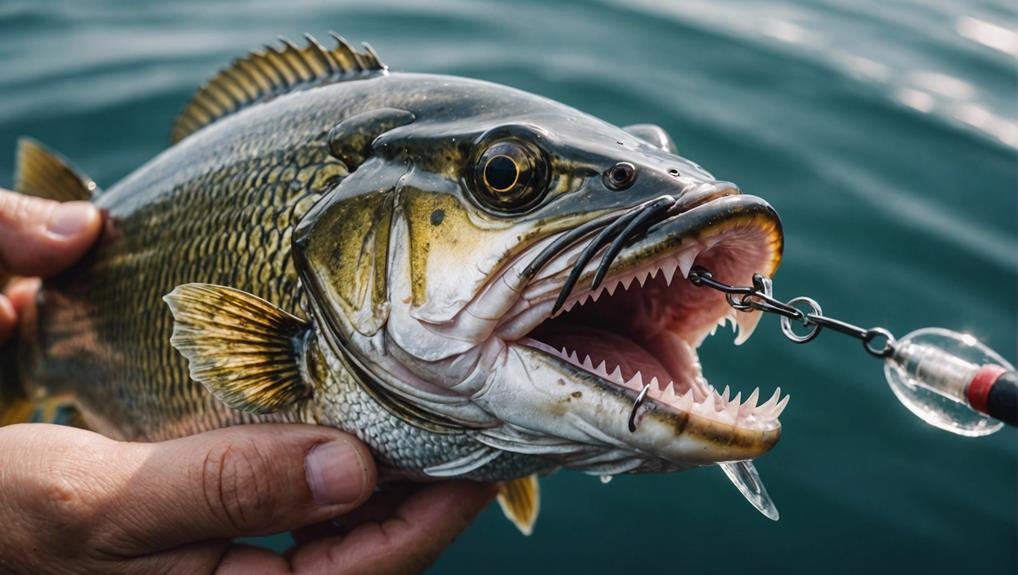
For large bass, you’ll want to use hook sizes that can handle the heft and power of these formidable fish. Picking the right hook size is essential to effectively landing these big fish. Popular hook sizes for large bass range from 1/0 to 5/0, depending on your bait size and line weight.
Here are some tips to keep in mind:
- Wide Gap Hooks: Sizes like 4/0 and 5/0 are highly recommended for bulky creature baits. The wide gap helps secure the bait and increases your chances of a solid hookup.
- Offhohohohookuprk is exceptionally good with the fathohohookupe offset design, which ensures a better hookup ratio to catch large bass.
- Hook Sizehoohoohookupatch your hook size to the behavior of your soft plastic lure. Bigger hooks for larger, bulkier baits help maintain the lure’s natural action, enticing big bass.
- Line and Hook Compatibility: Ensure your hook size matches the line weight. Stronger lines paired with appropriate hook sizes will handle the power of a large bass.
Types of Hooks
When selecting the appropriate hook type for bass fishing, it’s important to understand the options available and their specific applications. There are several styles to choose from, each suited for different baits and fishing methods.
Worm hooks are particularly popular in bass fishing. These include straight shank, offset, EWG (Extra Wide Gap), and Neko hooks. A straight shank hook is ideal for soft plastics, offering a strong hold,, and is is great for strongholdhavy cOn the other hand, offset hooks are versatile and excellent for various rigging techniques. If you’re using bulky baits, EWG hooks provide the extra gap needed to secure the bait and make effective hooksets.
In addition to worm hooks, treble hooks are commonly found on hard artificial lures. These hooks are available in various sizes and styles, perfect for crankbaits and topwater lures.
Inline hooks feature a straight eye and are great for spinning baits and other lures. They are suitable for both freshwater and saltwater fishing.
Combination hooks like the Tokyo Rig, Weighted Swimbait, and Assist Hooks offer versatility, allowing you to adapt to different fishing scenarios. Understanding the size and style of each hook will help you choose the best option for your bass fishing needs.
Best Hooks for Worms
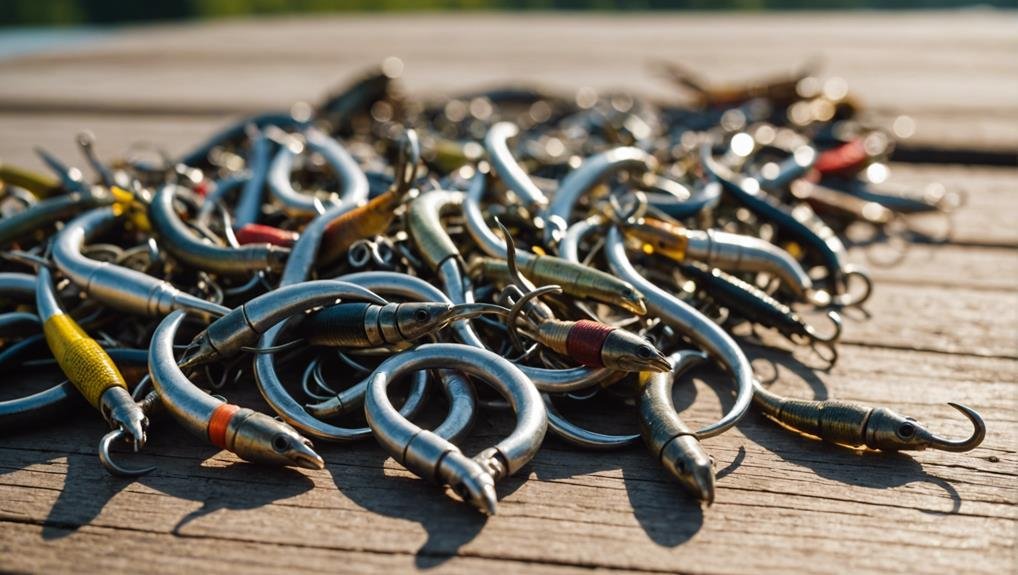
Understanding the different types of hooks is key, but knowing the best hooks for worms can greatly enhance your bass fishing success. The right hook size and style can make a significant difference when you’re Texas-rigging worms.
Here’s what you need to know:
- Hook Styles: Sproat and offset-shank worm hooks are top choices for Texas-rigged worms. These hooks are designed to keep your worm in place and improve hookup ratehoohoohoohoohookupof thehoohoohookupt should match the length of your worm. A 3/0 hook is ideal for worms 4 to 7 inches long. If you’re using longer worms, between 8 and 12 inches, opt for a 4/0 or 5/0 hook.
- Worm Length: Longer worms require larger hooks to guarantee proper presentation and effective rigging. This prevents the worm from slipping off and makes it more enticing to bass.
- Presentation Styles: Specific hook styles can benefit different presentation styles. A properly sized hook enhances the worm’s natural movement, making your bait more appealing to bass.
Offset Hooks for Bass
Offset hooks offer a versatile and reliable option for bass anglers. They guarantee your bait stays secure and increase your chances of a successful catch. These hooks are designed to prevent bait slippage, which is especially useful when using soft plastic baits. The unique shape of an offset hook, with its offset shank and wide gap, allows it to hold fatter baits effectively, making it ideal for targeting bass.
When you’re out on the water, you’ll appreciate the versatility of offset hooks. They work particularly well with weightless, soft plastic jerk baits, providing a natural presentation that can entice even the most cautious of bass. This setup is especially effective in open-water scenarios where a subtle, lifelike movement of the bait is crucial for attracting fish.
Anglers like Scaleface prefer offset hooks due to their adaptability with different bait types. Whether using worms, creature baits, or other soft plastics, the offset design ensures that the bait stays in place, increasing your hookup ratihookhookhookhookhookupnditions
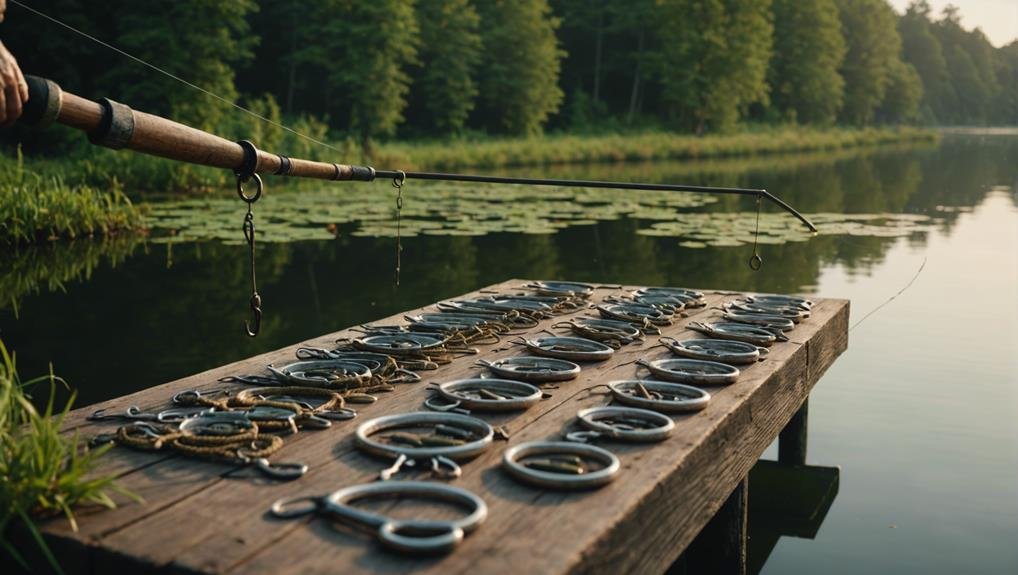
Choosing the apprhookhookhookup for your bass fishing setup can greatly impact your success on the water. Matching your hook size to the conditions you’re fishing in and the type of lure you’re using is essential. Here’s a quick guide to help you choose:
- Soft Plastic Lure: When using soft plastic lures, it’s important to match the hook size to the size of your lure. Typically, a 3/0 to 5/0 hook works well with most bass-sized soft plastics, ensuring a natural presentation and effective hook set.
- Offset Hooks: If you’re fishing weightless soft plastic jerk baits in open water, offset hooks are the way to go. Their design helps keep the bait weedless and provides good hookup ratihookuhookuhookuhookuhookup hooks are ideal for lightehookuhookuhookup fishing techniques. They penetrate easily with minimal pressure, making them perfect for delicate presentations and smaller bass.
- Stronger Hooks: Stronger hooks are necessary when targeting larger bass in heavy cover. They won’t bend or break under pressure, allowing you to pull big fish out of thick vegetation.
Always keep your hooks sharp and properly sized for the conditions to maximize your chances of landing that trophy bass.
Top Hook Brands
When selecting hooks for bass fishing, top brands like VMC, Gamakatsu, and Eagle Claw offer reliable, high-quality options that can significantly improve catch rates. Expert anglers trust these brands for their durability and effectiveness. Choosing the right hook can be vital, especially when considering the type of fishing you’ll be doing.
Here’s a quick comparison of some popular hook styles and brands:
| Brand | Hook Style | Special Feature |
|---|---|---|
| VMC | Redline | Extra-wide gap |
| Eagle Claw | Lazer Sharp | Short shank |
| Owner | Stinger Treble | High durability |
| Mustad | KVD | Versatile design |
Hooks significantly impact your fishing success, so selecting the right one for your needs is a good idea. For example, a short shank hook from Eagle Claw can be excellent for certain lures, while an extra-wide gap hook from VMC might be better for larger baits. Each brand and style offers unique advantages tailored to specific fishing techniques, ensuring you have the best tools for the job. So, when you’re gearing up for your next bass fishing adventure, remember that the right hook can make all the difference.
Conclusion
When choosing hook sizes for bass fishing, always consider the size of the bass, the type of bait, and the fishing environment.
For small bass, 2/0 to 4/0 hooks work well, while medium bass needs similar sizes for larger baits.
For large bass, opt for 1/0 to 5/0 hooks, especially wide-gap ones like 4/0 and 5/0.
Matching your hook size to these factors will boost your hooking efficiency and fishing success.
FAQs
What size hook is best for bass fishing?
The best hook sizes for bass fishing typically range from 2/0 to 5/0. A 2/0 hook is ideal for smaller baits and finesse techniques, while larger hooks like 4/0 or 5/0 are better for bigger baits and targeting larger bass. The specific size depends on the bait and fishing technique you use.
How do I choose the right hook size for different bass fishing techniques?
For different bass fishing techniques:
- Worm Fishing: Use 2/0 to 3/0 hooks for smaller worms and 4/0 to 5/0 hooks for larger worms.
- Soft Plastics: 3/0 to 4/0 hooks work well with soft plastic lures like creature and stick baits.
- Jig Fishing: Choose a hook size that matches the jig head weight, typically 3/0 to 5/0.
- Topwater Lures: For smaller topwater baits, use 2/0 to 3/0 hooks and 4/0 to 5/0 hooks for larger topwater lures.
Why is it important to use the correct hook size for bass fishing?
Using the correct hook size is important because it ensures a better hook set, reduces the chances of the bass spitting the hook, and minimizes harm to the fish. A properly sized hook matches the bait and fishing technique, making it more appealing to the bass and increasing your chances of a successful catch.
